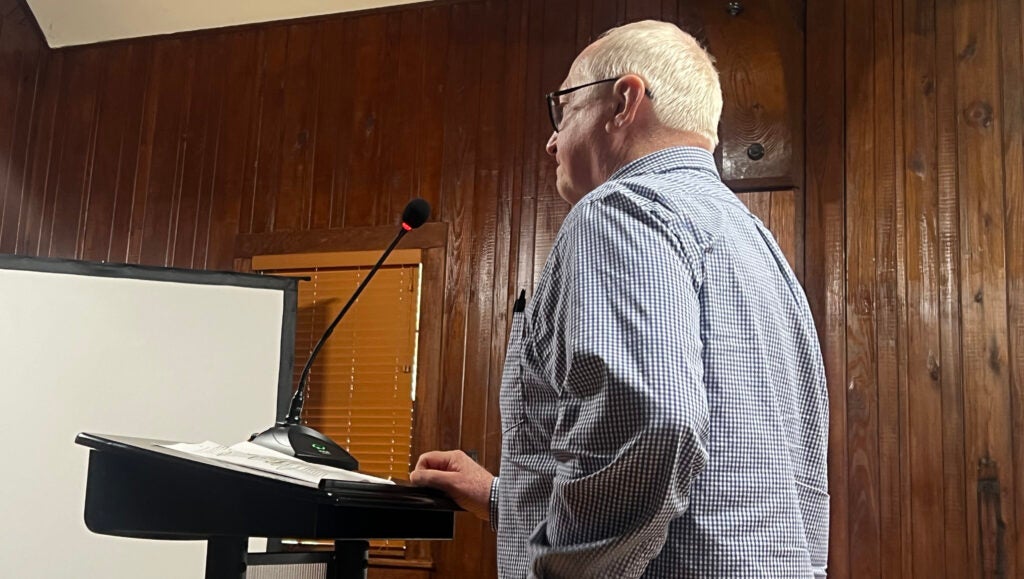Wilkinson County man addresses deer concerns at commission meeting
Published 1:21 pm Friday, March 22, 2024

- Troy Orso is a Wilkinson County landowner and hunter. He made public comment at the MDWFP Commission meeting Thursday morning. (Hunter Cloud | The Natchez Democrat)
|
Getting your Trinity Audio player ready...
|
MCCOMB — Jason Thompson opened the Mississippi Department of Wildlife, Fisheries and Parks Commission meeting business session with a prayer Thursday morning. Commissioners Bill Cossar, Leonard Bentz and William Mounger were present at Percy Quin State Park for the meeting where public comments lasted over an hour.
Executive Director Lynn Posey prefaced the public comment period that each person would have about five minutes to speak.
Troy Orso was the first man to take the podium. He said he was a retired engineer who lives in Wilkinson County where he is a landowner and hunter. Money, time and effort have gone into the sport, specifically the hunting of deer.
“One of my objectives was to buy a property and hunt. I have investment in the sport. I’m very interested in what y’all decide to do with CWD,” Orso said. “In regards to transmission of the disease to humans, I’ve looked at the CDC website. It does recommend that you have your deer tested. It will be a big burden for the hunter. I kill close to the limit every year. It is a big burden.”
Hunters have a couple of options if they want a deer tested for Chronic Wasting Disease. MDWFP provides 59 24/7 self-serve drop-off locations across the state or hunters can find a participating taxidermist on the MDWFP website. Hunters in Wilkinson County would have to take a sample to the Wilkinson County Sheriff’s Office at 1389 US61 South in Woodville.
Orso said now that CWD was detected in Claiborne County it has moved closer to him and his fellow landowners. He said discussion with them has settled on some conclusions.
“I don’t believe in discussion with my fellow landowners that we will prevent the spread of CWD. What is important is to slow down the spread of the disease,” Orso said. “I live and hunt in Wilkinson County. We know CWD is not too far from there. Banning the feed slows it down and all of the people I’m associated with say to ban it.”
From a personal management perspective, Orso said they have always relied on food plots and naturally occurring food sources and wouldn’t mind a ban on supplemental feed. He currently uses a mobile feeder similar to a seed spreader to cast 50 pounds of corn. He believes the spreading of corn could lessen the risk of transmission of diseases. His feeding ends in the fall once food plots become productive.
Orso did suggest if MDWFP was to ban supplementally feeding then it would be best to have a way to enforce the ban. MDWFP is currently working to train new officers.
One of his last points was the importance of education between hunters.
“If people understand the risks and CWD they have an invested interest. It is in our best interest as hunters to encourage others not to feed,” Orso said.
He stated the high fence enclosures should abide by the same rules in regards to supplemental feeding and added he does not believe the fence alone prevents Chronic Wasting Disease.New research by Mississippi State University shows raccoons can actually carry CWD prions on their paws and contaminate feeders.
Orso had one more point of concern, one that was recently a real issue in Adams County. The transportation of deer.
“One thing that has concerned me in the past is the transportation of deer. It is currently banned but why is it only banned for deer and not other cervids. I’ve concluded the white-tailed deer falls under your jurisdiction while others fall under the agriculture commission,” Orso said. “I encourage you to work with them to stop the transportation of all cervids.”





